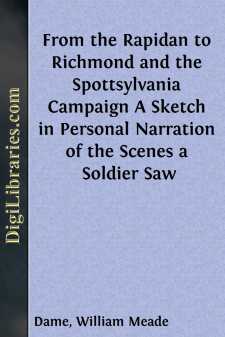Categories
- Antiques & Collectibles 13
- Architecture 36
- Art 48
- Bibles 22
- Biography & Autobiography 813
- Body, Mind & Spirit 142
- Business & Economics 28
- Children's Books 14
- Children's Fiction 11
- Computers 4
- Cooking 94
- Crafts & Hobbies 4
- Drama 346
- Education 46
- Family & Relationships 57
- Fiction 11829
- Games 19
- Gardening 17
- Health & Fitness 34
- History 1377
- House & Home 1
- Humor 147
- Juvenile Fiction 1873
- Juvenile Nonfiction 202
- Language Arts & Disciplines 88
- Law 16
- Literary Collections 686
- Literary Criticism 179
- Mathematics 13
- Medical 41
- Music 40
- Nature 179
- Non-Classifiable 1768
- Performing Arts 7
- Periodicals 1453
- Philosophy 64
- Photography 2
- Poetry 896
- Political Science 203
- Psychology 42
- Reference 154
- Religion 513
- Science 126
- Self-Help 84
- Social Science 81
- Sports & Recreation 34
- Study Aids 3
- Technology & Engineering 59
- Transportation 23
- Travel 463
- True Crime 29
From the Rapidan to Richmond and the Spottsylvania Campaign A Sketch in Personal Narration of the Scenes a Soldier Saw
Categories:
Description:
Excerpt
“The land where I was born” was, in my childhood, a great battleground. War—as we then thought the vastest of all wars, not only that had been, but that could ever be—swept over it. I never knew in those days a man who had not been in the war. So, “The War” was the main subject in every discussion and it was discussed with wonderful acumen. Later it took on a different relation to the new life that sprung up and it bore its part in every gathering much as the stories of Troy might have done in the land where Homer sang. To survive, however, in these reunions as a narrator one had to be a real contributor to the knowledge of his hearers. And the first requisite was that he should have been an actor in the scenes he depicted; secondly, that he should know how to depict them. Nothing less served. His hearers themselves all had experience and demanded at least not less than their own. As the time grew more distant they demanded that it should be preserved in more definite form and the details of the life grew more precious.
Among those whom I knew in those days as a delightful narrator of experiences and observations—not of strategy nor even of tactics in battle; but of the life in the midst of the battles in the momentous campaign in which the war was eventually fought out, was a kinsman of mine—the author of this book. A delightful raconteur because he had seen and felt himself what he related, he told his story without conscious art, but with that best kind of art: simplicity. Also with perennial freshness; because he told it from his journals written on the spot.
Thus, it came about that I promised that when he should be ready to publish his reminiscences I would write the introduction for them. My introduction is for a story told from journals and reminiscent of a time in the fierce Sixties when, if passion had free rein, the virtues were strengthened by that strife to contribute so greatly a half century later to rescue the world and make it “safe for Democracy.”
It was the war—our Civil War—that over a half century later brought ten million of the American youth to enroll themselves in one day to fight for America. It was the work in “the Wilderness” and in those long campaigns, on both sides, which gave fibre to clear the Belleau Wood. It was the spirit of the armies of Lee and Grant which enabled Pershing’s army to sweep through the Argonne.
Rome, March 27, 1919.
WOLSELEY’S TRIBUTE TO LEE
The following tribute to Robert E. Lee was written by Lord Wolseley when commander-in-chief of the armies of Great Britain, an office which he held until succeeded by Lord Roberts.
Lord Wolseley had visited General Lee at his headquarters during the progress of the great American conflict. Some time thereafter Wolseley wrote:
“The fierce light which beats upon the throne is as a rushlight in comparison with the electric glare which our newspapers now focus upon the public man in Lee’s position. His character has been subjected to that ordeal, and who can point to a spot upon it? His clear, sound judgment, personal courage, untiring activity, genius for war, absolute devotion to his State, mark him out as a public man, as a patriot to be forever remembered by all Americans. His amiability of disposition, deep sympathy with those in pain or sorrow, his love for children, nice sense of personal honor and generous courtesy, endeared him to all his friends. I shall never forget his sweet, winning smile, nor his clean, honest eyes that seemed to look into your heart while they searched your brain. I have met with many of the great men of my time, but Lee alone impressed me with the feeling that I was in the presence of a man who was cast in a grander mold and made of different and finer metal than all other men. He is stamped upon my memory as being apart and superior to all others in every way, a man with whom none I ever knew and few of whom I have read are worthy to be classed. When all the angry feelings aroused by the secession are buried with those that existed when the American Declaration of Independence was written; when Americans can review the history of their last great war with calm impartiality, I believe all will admit that General Lee towered far above all men on either side in that struggle....


